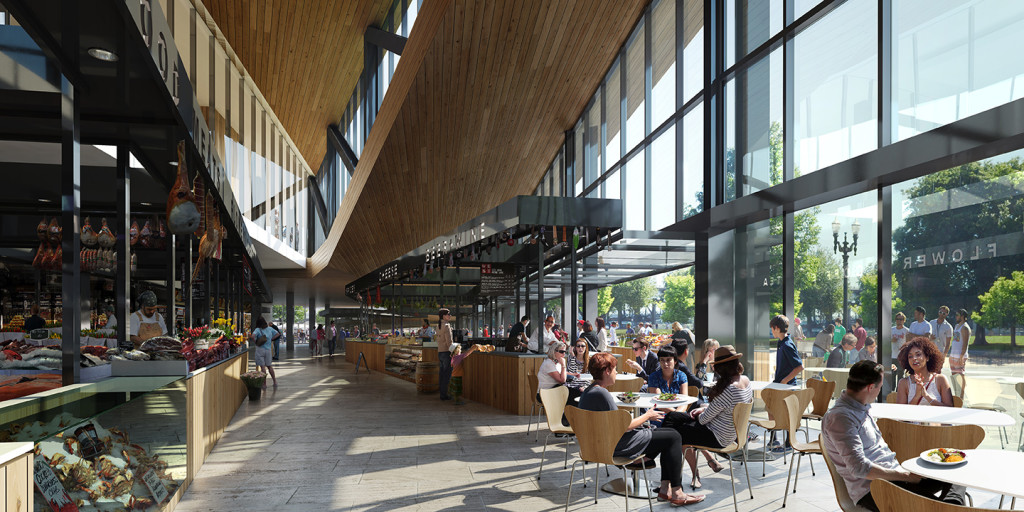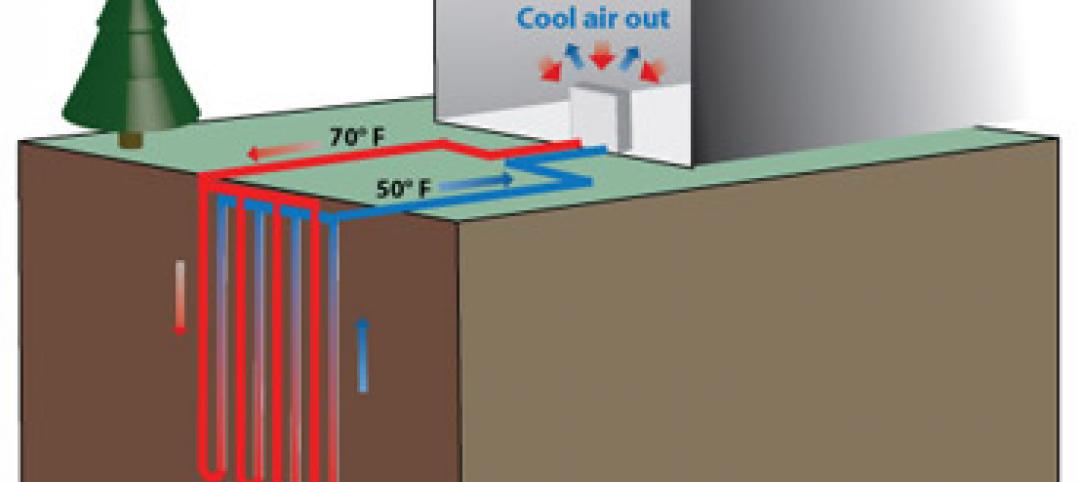It’s been more than 70 years since Oregon’s largest city, Portland, has had a public market. In response to the city's thriving culinary scene, residents have formed the non-profit organization James Beard Public Market, and Snøhetta designed what will be Portland’s first year-round market since 1942, when the Portland Public Market closed down.
Named after prominent gastronomical figure James Beard, who Dezeen reports “developed an interest in food at an early age after accompanying his mother on shopping trips to Portland markets,” the market will reintroduce the hustle and bustle of commerce and public vibrancy to the western end of Morrison Bridge on the Willamette River.
The bridge, which currently splits the market’s future site in half and blocks pedestrian access from three sides, will be realigned by the architects with access ramps, and a new pedestrian through-road will make the new market accessible from all directions.

Snøhetta’s design will have room for 60 permanent stalls, 30 flexible stands, restaurants, a teaching kitchen, and an events space.
"A generous pedestrian street will run north and south, swelling at the sunniest portion of the site, to create an outdoor room for vendor stalls, seating, and green areas for Pacific Northwest native plantings," the design team added in a statement.
Construction is set to start in 2016. This isn’t the Oslo-based firm’s only project in Oregon—they have been called on to revitalize an abandoned paper mill on the Willamette Falls near Oregon City into a mixed-use public destination, giving the public up-close access to the falls for the first time.

Related Stories
| Nov 25, 2013
Building Teams need to help owners avoid 'operational stray'
"Operational stray" occurs when a building’s MEP systems don’t work the way they should. Even the most well-designed and constructed building can stray from perfection—and that can cost the owner a ton in unnecessary utility costs. But help is on the way.
| Nov 19, 2013
Top 10 green building products for 2014
Assa Abloy's power-over-ethernet access-control locks and Schüco's retrofit façade system are among the products to make BuildingGreen Inc.'s annual Top-10 Green Building Products list.
| Nov 15, 2013
Greenbuild 2013 Report - BD+C Exclusive
The BD+C editorial team brings you this special report on the latest green building trends across nine key market sectors.
| Nov 15, 2013
Metal makes its mark on interior spaces
Beyond its long-standing role as a preferred material for a building’s structure and roof, metal is making its mark on interior spaces as well.
| Nov 13, 2013
Installed capacity of geothermal heat pumps to grow by 150% by 2020, says study
The worldwide installed capacity of GHP systems will reach 127.4 gigawatts-thermal over the next seven years, growth of nearly 150%, according to a recent report from Navigant Research.
| Oct 30, 2013
11 hot BIM/VDC topics for 2013
If you like to geek out on building information modeling and virtual design and construction, you should enjoy this overview of the top BIM/VDC topics.
| Oct 28, 2013
Urban growth doesn’t have to destroy nature—it can work with it
Our collective desire to live in cities has never been stronger. According to the World Health Organization, 60% of the world’s population will live in a city by 2030. As urban populations swell, what people demand from their cities is evolving.
| Oct 25, 2013
$3B Willets Points mixed-use development in New York wins City Council approval
The $3 billion Willets Points plan in New York City that will transform 23 acres into a mixed-use development has gained approval from the City Council.
| Oct 23, 2013
Gehry, Foster join Battersea Power Station redevelopment
Norman Foster and Frank Gehry have been selected to design a retail section within the £8 billion redevelopment of Battersea Power Station in London.
| Oct 18, 2013
Researchers discover tension-fusing properties of metal
When a group of MIT researchers recently discovered that stress can cause metal alloy to fuse rather than break apart, they assumed it must be a mistake. It wasn't. The surprising finding could lead to self-healing materials that repair early damage before it has a chance to spread.

















